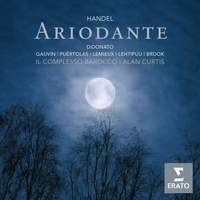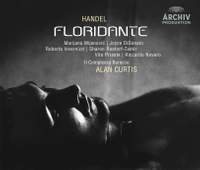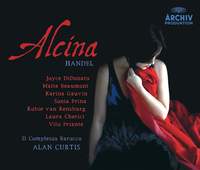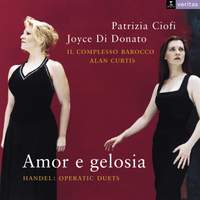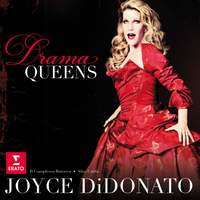Interview,
Joyce DiDonato on 'In War and Peace'
 “In the midst of chaos, how do you find peace?” - Joyce DiDonato didn't initially set out to address such a weighty question with her new recording on Erato, but the horrific events which unfolded during the preparation-stage prompted a sudden and dramatic change in direction. The American mezzo was hard at work researching repertoire for a sequel to her acclaimed Drama Queens disc last November when news broke of the terrorist attacks in Paris, and immediately felt compelled to respond by focusing her energies on exploring music which confronts the horrors of conflict and, more importantly, the possibility of achieving some kind of 'harmony through music'.
“In the midst of chaos, how do you find peace?” - Joyce DiDonato didn't initially set out to address such a weighty question with her new recording on Erato, but the horrific events which unfolded during the preparation-stage prompted a sudden and dramatic change in direction. The American mezzo was hard at work researching repertoire for a sequel to her acclaimed Drama Queens disc last November when news broke of the terrorist attacks in Paris, and immediately felt compelled to respond by focusing her energies on exploring music which confronts the horrors of conflict and, more importantly, the possibility of achieving some kind of 'harmony through music'.
Featuring music by Jommelli, Leo, Handel, Monteverdi and Purcell, In War and Peace explores the psychology of various baroque characters caught in the midst of conflict and/or trying to negotiate some sort of resolution to the discord which surrounds them, ranging from the abject despair of Purcell's Dido and the impotent rage of Handel's Sesto to the post-war jubilation of Handel's Cleopatra.
Whilst she was in London last month, Joyce kindly found time to answer our 4 questions about the project on camera - you can view the ensuing short videos below, and read the questions along with the full transcripts underneath.
Questions 1-3: Joyce talks about portraying victims, strong women and working with Il Pomo d'Oro
Full transcript of this 6 minute video:
Question 1: Most of the characters who appear on the disc are victims of conflict rather than aggressors or warriors: was it a conscious decision to focus on them rather than on figures who glorify war?
It is true that a lot of the characters I’m singing in this project are a little bit on the victim side (certainly not Agrippina – she’s the instigator!), but I think in opera when you have the victim as the person suffering …well, it gives a great landscape for suffering through the opera, which of course we love. But I think one of the things I have tried to do in this project is also show those that are in a way victims of glorifying war - Alcina’s internal war, for example. When we have the opening track, 'Scenes of horror’, it’s taking in this landscape and commenting on the darkness of it and the horror of it. It was very important to me to show the darkness, and to show the rubble, and the torment of being in the throes of war. We needed to start there so that the art coming out into the light, into tranquillity, into peace, actually emerges from somewhere - and the truth is that the dark side is a part of each of us as a human being. But we also have the light side, and we have the idea of being able to encompass both of those things. My hope is that this project will give us a little bit more chance to implement the power to choose which side of that we nourish and which side of ourselves we engage and react with. So it was important to show the darkness in order to propel ourselves into the light.
Question 2: Several of the women here would be equally at home on Drama Queens (and vice versa) – did this project grow out of the material you explored with that earlier disc?
One of the reasons I adore the world of baroque music is that the composers have given us incredibly flawed, empowered, strong, weak, tyrannical and magical female figures. From Alcina to Agrippina to Dido to Cleopatra...there’s this huge range of powerful and yet fragile women. I still have yet to understand how Handel could understand the true essence of a woman so completely as he does, but every time I enter into this world with these women who are against very strong circumstances and have to either collapse or find strength or search for it, not only does it give great dramatic impulse but also it opens up to these incredible vocal lines, either with fabulous fireworks or a kind of lamenting pathos, and those arias where we don’t know why but they make us weep. So it was lovely in the world of Drama Queens a few years ago to explore these specific women and I think it’s nice now to come into this world where we’re talking about war and peace and can we find a kind of tranquillity within, using mostly these very strong women. (We do have little Sesto in there as well, whom I’ve loved from the beginning of my career!), but I have to say it is truly a gift from these composers to sing such complicated and interesting women.
Question 3: You’ve been working with Il Pomo d’Oro a lot since the death of Alan Curtis last year – how different an experience is it to working with Il Complesso Barocco, and what’s special about them for you?
Ah, Il Pomo d’Oro!!! Not only have they been my musical companions for I think 13 years, going back to the first disc with divine Patrizia Ciofi, Amor e gelosia (recorded in a very hot studio in a hot summer in Firenze, I’ll never forget it!), so I’ve been with many of them for 13 years, and many of the members of Il Complesso Barocco have transferred into this band. We’ve grown together as musicians and artists, but also as friends – we’ve travelled the world together, we have explored all kinds of highs and lows on the stage, through the music of Alcina, Ariodante and Floridante, and now this world of war and peace, searching together to see if we can find harmony in music. It has really been a thrill to take this journey with them for so long, and of course it all goes back to Alan Curtis who founded Il Complesso Barocco and did an encyclopaedic amount of recording and research to be part of this huge baroque renaissance which we’re happily enjoying today, and one of the results of is this very dynamic versatile and vibrant group Il Pomo d'Oro. What’s really thrilling is that I know on this particular project they are my partner in creating a theatrical experience, both through the album and in our concert tour, so that we'll join together telling the same story, asking the same questions, and putting out the same message of hope and of peace. They’re not just a band that accompanies a singer – they’re a group of earnest musicians and people that are really trying to say something with the music, and that’s why I love to work with them, why I keep coming back home together, and why we hope to see YOU in a concert around the world sometime!
Question 4: Joyce tells us a little more about the #TalkPeace project
Full transcript of this 4 minute video:
Question 4: Last year you performed Dido’s Lament at the Stonewall Inn in Greenwich, to commemorate the victims of anti-gay hate crime – tell us more about the #TalkPeace campaign and how we can work towards ‘harmony through music’…
This is sincerely my most personal project to date. Those of you who have followed me will know that I speak a lot about how music can heal, and I think I’m not alone in the world today where we’re all feeling a little bit weighted down by the circumstances in the world...We’re on the internet and we’re following everything, and there’s more bad news and more bad news, and the news itself is a catastrophe of turmoil. But at the same time I’m such an optimist (I call myself a 'belligerent optimist'!), and ultimately I believe that there’s much more good than bad in the world – maybe I’m naïve, I admit it, but that’s what I see, and I wanted at this moment in time to actually see if what I’ve been saying over the years is true: can music heal us? I would never presume to think I have the answer for world peace! I’m not attempting to say that, but I do think the serenity of a beautiful Handel aria, the calming sound-world of a Purcell aria that is coming from I-don’t-know-where - these things help us, somehow bypass the intellect and bypass the brain and touch us in a way that we don’t always understand in ourselves, and it shows us how to calm down. It helps us to soothe ourselves, it helps us to release some of that tension we’ve been feeling in our day-to-day lives. I know this to be true in my life, and many of you have written to me and said that’s it’s true in your life, that it’s actually changed you. So my whole point with this project and the idea of #talkpeace, is Why don’t we put our money where our mouths are and see if we can embrace this concept right now - I my life, in your life, right here, just choose peace. Not solve world peace, not capture it for a year, but in this moment can we just calm down? And then maybe that moment lasts for two moments, and then we find ourselves in chaos again, but we know where to come back to – into a place of serenity. I think if we can all do our part with that, pretty soon that starts emanating out, ricocheting out, and then pretty soon what we see is more calm around us. As I said, maybe I’m naïve...but I think there’s some merit to it, and I think Purcell, Handel, Jommelli, Monteverdi have a key, I think they’re showing us the way. So I invite you to experiment and see if that’s true – let’s talk peace.
You can browse Joyce DiDonato's complete discography here, and view the international concert-schedule for 'In War and Peace: Harmony through Music' here.
The new 'In War and Peace album' is available now
Available Formats: MP3, FLAC, Hi-Res FLAC
Other Recordings referenced in this interview
Handel: Ariodante
Joyce DiDonato, Karina Gauvin, Marie-Nicole Lemieux, Sabina Puértolas, Topi Lehtipuu), Matthew Brook; Il Complesso Barocco, Alan Curtis.
'[DiDonato's] bravura technique - great Rossini singer that she is - is second to none in 'Dopo notte'. She also brings a rich palette of vocal colour and emotional nuance to Ariodante's other sublime arias...[This is] perhaps the most consistently well-cast Ariodante on record.' (International Record Review)
Available Formats: MP3, FLAC
Handel: Floridante
Marijana Mijanovic, Joyce DiDonato, Roberta Invernizzi, Vito Priante; Il Complesso Barocco, Alan Curtis
'The great glory of the set is Joyce DiDonato as Elmira, not just fresh-toned, with flawless legato in her lyrical arias, but dazzlingly brilliant in the florid ones.' (Penguin Guide)
Available Formats: MP3, FLAC
Handel: Alcina
Joyce DiDonato, Maite Beaumont, Karina Gauvin, Sonia Prina, Kobie Van Rensburg, Laura Cherici, Vito Priante; Il Complesso Barocco, Alan Curtis
'DiDonato’s velvety, sensuous mezzo is a surprising choice for Handel’s majestically tormented sorceress...She rises magnificently to the challenges of Alcina’s great, wrenching scenes of despair.' (Sunday Times)
Available Formats: MP3, FLAC
Handel: Amor e gelosia
Patrizia Ciofi (soprano), Joyce DiDonato (mezzo); Il Complesso Barocco, Alan Curtis
'[DiDonato] has just the right firmness and focus for a castrato role (as the mezzo voices almost always are here); both phrase beautifully, articulate and express the words clearly and tellingly, and ornament the da capo sections in a natural and tasteful fashion.' (Gramophone Guide)
Available Formats: MP3, FLAC
Drama Queens: Royal Arias from the 17th and 18th Centuries
Joyce DiDonato (mezzo); Il Complesso Barocco, Alan Curtis
'The virtuosity needed to triumph over the swift scalework is coruscatingly supplied by DiDonato...Alan Curtis's Complesso Barocco's partnership is invaluable...This is a treasure of a disc, for the music, the orchestra and Joyce DiDonato.' (International Record Review)
Available Formats: CD, MP3, FLAC




